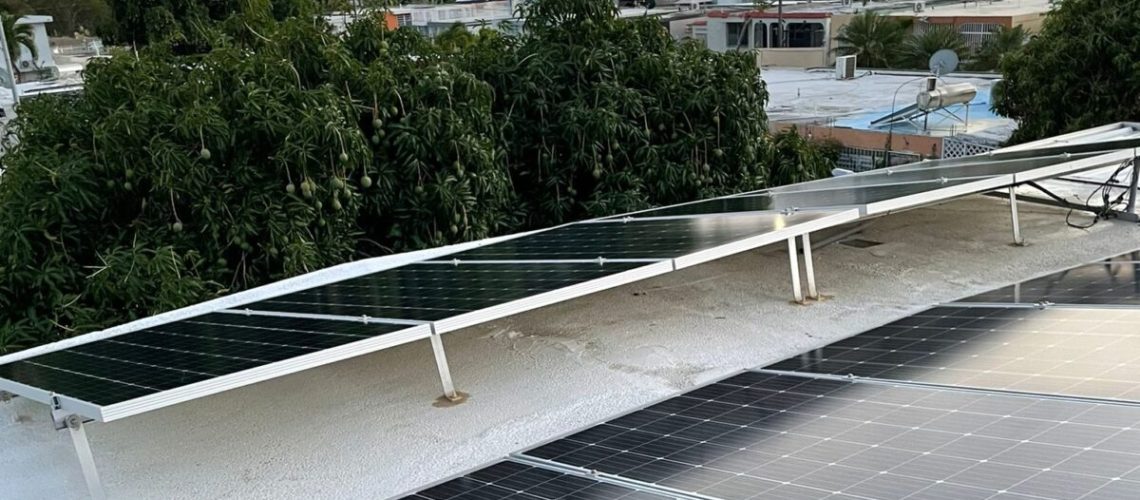Solar and battery manufacturers as well as non-profits filed a bill stating that the net metering policy was legally enacted and is crucial for the ability of Puerto Ricans to keep the lights on.
A coalition of 28 organizations, including leading U.S. and Puerto Rican nonprofits, solar and battery companies, filed a brief in federal court to stand against changing Puerto Rico’s net metering policy.
The Financial Oversight and Management Board for Puerto Rico (FOMB) launched a legal attack on Act 10, a law that extends Puerto Rico’s net metering program through 2030. The coalition argues in its Friend of the Court (Amicus) brief that the policy was legally enacted and if changed, would threaten the island’s progress in solar energy and resilience.
Puerto Rico has increased its renewable generation to 12% from 4% three years ago, said PJ Wilson, president of the Solar and Energy Storage Association of Puerto Rico (SESA-PR), and could reach 18% to 20% next year, in comparison to the 40% goal set by Puerto Rico law. The territory will account for 10% of the entire U.S. market for residential solar in 2028, according to Chris Collins, founder of Ohm Analytics..
Central to Puerto Rico’s future success with residential solar is the net metering law, Act 10-2024, that extended the territory’s net metering policy for solar through 2031. Signed into law in January, Act 10 was passed unanimously by the Puerto Rico House and Senate and was unopposed by the island’s regulator. The coalition contends that the law was legally enacted.
Net metering, originally created by law in Puerto Rico in 2007, has been a lifeline for communities affected by years of ongoing power blackouts.
“10% of Puerto Rico’s houses now have solar with backup battery power thanks to the policy of net metering,” explained PJ Wilson, executive director of the Solar and Energy Storage Association of Puerto Rico (SESA). “We’re fighting for the ability of the other 90% to be able to as well.”
The FOMB stated in a letter that the fiscal plan it certified for PREPA requires the Puerto Rico Energy Bureau to determine whether to make changes to the net metering system. Because the energy bureau has not yet done so, FOMB said that Act 10 is “directly at odds” with the PREPA fiscal plan. The FOMB included with the letter its resolution directing the Puerto Rico legislature and governor to repeal Act 10 or amend it “in a manner consistent with the fiscal plans.”
The brief filed by the coalition supports defensive positions taken in court by the Defendant, Governor Pierluisi, and by the President of the Puerto Rico Senate. It explains that FOMB’s opposition to solar power disregards unanimous votes for Act 10 across all five political parties in Puerto Rico’s legislature.
In a May 2024 letter from 21 members of the U.S. Congress urging FOMB to drop its harmful attack on solar. A coalition of national and Puerto Rico nonprofits has also called upon the White House to help.
“Net metering is more than a policy; it’s a pathway to hope for Puerto Ricans facing frequent outages and high energy costs,” said Javier Rúa Jovet, public policy director for SESA. “This coalition is standing up to defend net metering because Puerto Rico deserves a reliable, clean energy future that FOMB’s actions seek to undermine.”
Abigail Ross-Hopper, president and CEO of the Solar Energy Industries Association (SEIA), one of the entities that signed the Amicus brief, stated that “smart policies like net metering truly anchor the broad adoption of solar, and in Puerto Rico, that translates into reliable and resilient energy”.
“The recent challenge to net metering in Puerto Rico is problematic because it very simply makes it more difficult for residents to produce their own power and save money on their monthly bills. As Puerto Rico works towards their goal of reaching 100% renewable energy while building out a resilient and reliable energy system, it is critical that we fight to protect net metering on the island,” said Hopper.
The Amicus brief was signed by the following organizations: Acadia Center, Astrawatt Solar, Bright Ops, Bright Panel, Carpe Diem Developers PR, EarthSpark International, EDPR NR DG, Elders Climate Action, Enphase Energy Inc, FranklinWH, Freedom Forever, GRID Alternatives, IREC, Mechanical Contractors Association of PR, Para la Naturaleza, Power Solar, Pytes, SMA, Sol-Ark, Solar and Energy Storage Association (SESA), Solar Energy Industries Association (SEIA), SolarEdge Technologies Inc, Sunnova, and Teksol Integration Group, Inc.



